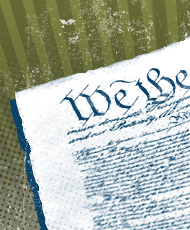Obama Administration Open To Patriot Act Reform

Department of Justice Letter To Congress Opens Door For Much-Needed Changes To Controversial Law
FOR IMMEDIATE RELEASE
CONTACT: (202) 675-2312 or media@dcaclu.org
WASHINGTON – In a letter sent to Senate Judiciary Chairman Senator Patrick Leahy (D-VT) Monday, the Department of Justice called for the reauthorization of three expiring provisions of the Patriot Act, but also expressed that the Obama administration is open to reforming those and other provisions. The Patriot Act was rushed through Congress just 45 days after September 11 and has led to egregious government misconduct. Three surveillance provisions – the John Doe roving wiretap provision, Section 215 or the “library records” provision and the “lone wolf” provision – are up for renewal this year and will expire on December 31 if Congress does not take action.
Senator Leahy has announced that the Senate Judiciary Committee will hold a hearing on the Patriot Act on Wednesday, September 23.
“We are very encouraged to learn that the Obama administration has stated a willingness to discuss reforming the deeply flawed provisions in the Patriot Act, though we are disappointed at its support for the reauthorization of the three expiring provisions,” said Michael Macleod-Ball, Acting Director of the American Civil Liberties Union Washington Legislative Office. “Though there may be some value to these provisions, they – like many other Patriot Act provisions – are written much too broadly and have already proven themselves to be problematic in the hands of law enforcement. The privacy rights of all Americans will continue to be at risk if we continue to let these statutes remain as they are.”
A number of inherently flawed Patriot Act provisions are not expiring this year, including the National Security Letter (NSL) provisions. The NSL provisions greatly expanded the FBI’s ability to secretly demand sensitive and private customer records from Internet Service Providers without prior judicial approval and to impose gag orders on record demand recipients. The FBI’s gross misuse and abuse of the NSL statute led to consecutive and embarrassing reports by the Department of Justice’s Office of the Inspector General. The ACLU has successfully challenged the constitutionality of the amended NSL statute’s gag provisions in a lawsuit called Doe v. Holder. A lower court ruled in 2007 that NSL gag provisions were unconstitutional and in December 2008, the U.S. Court of Appeals for the Second Circuit upheld that ruling in part, agreeing that the NSL statute’s gag provision violated the First Amendment. The case is once again before the lower court and the ACLU is contesting the constitutionality of the gag order that has been imposed on its John Doe client for more than five years.
The ACLU has urged Congress to take the opportunity presented by the expiration of some Patriot Act provisions and use it to revisit other problematic sections of the law, as well as other changes made to surveillance laws since 2001. Specifically, the ACLU is asking that Congress:
- Narrow the scope of the NSL authority, adding judicial oversight to all NSL requests;
- Reform the overly broad material support statute;
- Revisit the changes made to the Foreign Intelligence Surveillance Act (FISA) last year in the FISA Amendments Act that gave the government sweeping and overbroad new surveillance power;
- Narrow the recent expansion of authorities given to FBI agents by the revamped Attorney General Guidelines that allow agents to conduct physical surveillance without suspicion;
- Expand oversight mechanisms such as audits by inspectors general and public disclosure requirements related to the Patriot Act and statutes that allow for surveillance of Americans.
“Over the last eight years, Congress has allowed numerous expansions of executive authority that have worked in tandem to infringe upon Americans’ rights,” said Michelle Richardson, ACLU Legislative Counsel. “It’s time for our lawmakers to take apart the massive surveillance mechanism it has built and examine each piece to develop wiser policies.”
To read the ACLU’s report “Reclaiming Patriotism” and learn more about the three Patriot Act provisions up for expiration this year, go to: www.reformthepatriotact.org
The ACLU’s report “Blocking Faith, Freezing Charity” on the effect of the broadened material support statute on Muslim charities can be found here: www.aclu.org/intlhumanrights/nationalsecurity/39849pub20090616.html
Stay Informed
Every month, you'll receive regular roundups of the most important civil rights and civil liberties developments. Remember: a well-informed citizenry is the best defense against tyranny.

